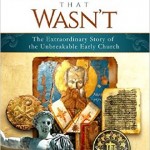Many years ago I formulated what I call the Pony Principle, which is this: if you really want a pony for Christmas, ask your parents for a pony. You probably won’t get it—but if you don’t ask for a pony, you certainly won’t get it.
Or, to put it less colorfully: ask for what you really want, even if it seems unreasonable. Of course, you have to ask cheerfully, and you have to be willing to take no for an answer; and when you get “No!” for an answer you have to take that cheerfully as well. But it sometimes happens that what seems unreasonable to you seems quite reasonable to the person you’re asking.
I formulated the Pony Principle whilst on vacation with Jane and our two oldest, who were then quite small. We were on a road trip from L.A. to Colorado Springs and back, and it was convenient to spend one night in Las Vegas, which at that time was in the middle of its brief “family friendly” period. We got there rather before check-in time—in fact, it was before noon—but I decided to ask whether or not we could check in early. I was told that our room hadn’t been cleaned yet, but if I checked again in an hour maybe it would be. So we toddled off to get some lunch.
And when I came back, the rooms still hadn’t been cleaned. The cleaning crew worked in a specific order, and they got to particular rooms when they got to them, and they hadn’t gotten to ours yet. I thanked the lady at the counter, told her that it was quite all right, no one had promised us anything, and said we’d check again later. And we toddled off again.
And when I came back the second time, the young lady saw me coming, waved me over to an empty spot at the counter, and said, “The room you booked still hasn’t been cleaned, so we’ve decided to give you a free upgrade to a nicer room.” And they did, and we got a jacuzzi tub with a view overlooking the airport.
The point is, we were cheerful about the whole thing. I’ve always thought that that’s why we got the upgrade: because we were cheerful and didn’t pitch a fit or give the clerk a hard time.
So color me surprised and pleased when I discovered that St. Thomas knew about the Pony Principle, and thought that it was just exactly the right way for a person to approach God. Denys Turner puts it this way in his current book, Thomas Aquinas:
Therefore, says Thomas, we ought to pray, as Jesus did in the garden of Gethsemane, “in response to our animal desire” (secundum sensualitatem). For when we pray as Jesus did then, out of animal need and desire— for Jesus was scared of death, as naturally any animal is— we are placing that animal need and desire within the interpretative power of the divine will itself, wherein alone we will discover our own real will. Therefore, Thomas concludes, we ought always to pray for what we think we want; for Jesus prayed as he did in Gethsemane so as to teach us just that lesson, namely that it is “permitted for human beings naturally to desire even what [they know] is not God’s will” and, as if in reinforcement of what for many is a startling thought, he cites the authority of Augustine to the same effect, commenting on the same prayer of Jesus: “It is as if [Jesus] were saying: ‘See yourself in me: for you [too] can wish something for yourself even though God wishes something else.’” Only thus, in the prayer of honest desire, is there any chance of our discovering what are our true desires, our real will.
We all have our real wants and desires; but in our sinfulness, what we want and desire is often not what we really need. God knows that, and will help us to learn to choose rightly. But that takes time; and it takes prayer; and so the best thing for me to do is to ask God for what I really want. Because that’s prayer, and it’s honest prayer, and it opens the door to God. It gives me something to work with.
So boldly ask God for what you really want. And if He says, “No,” be prepared to respond cheerfully and with more prayer.















